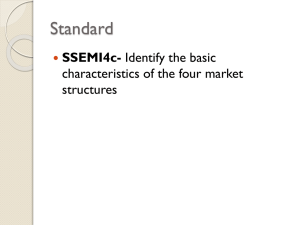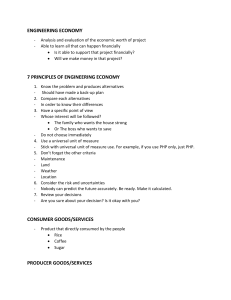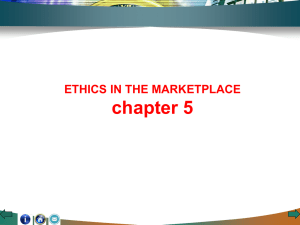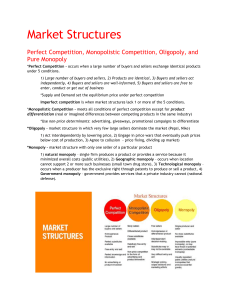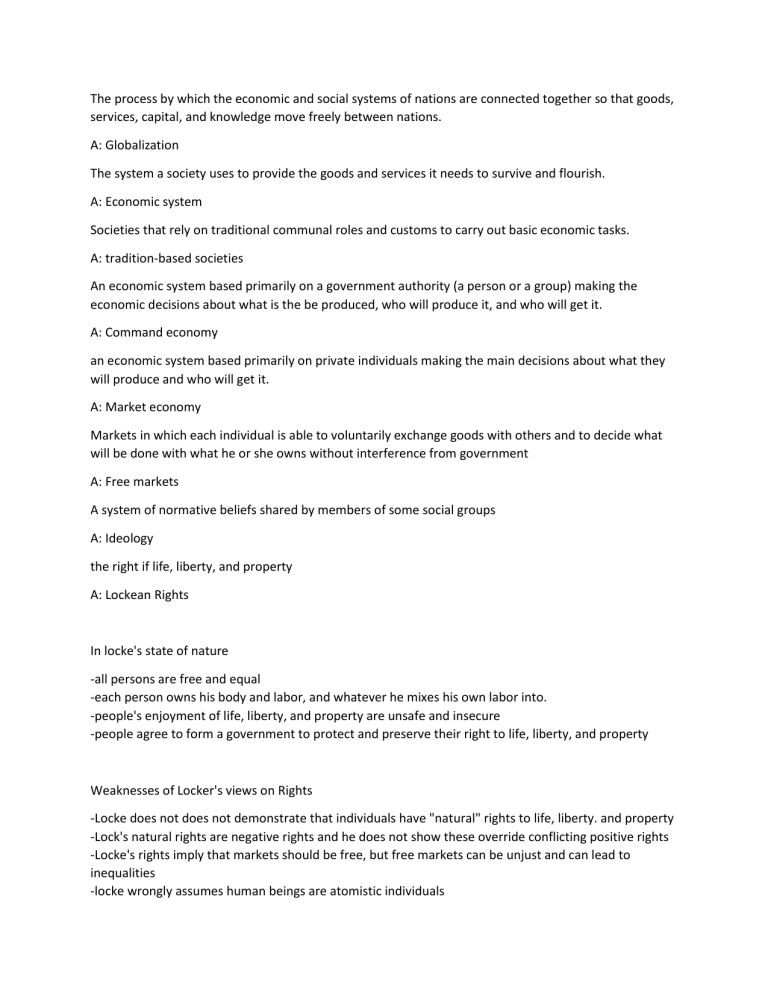
The process by which the economic and social systems of nations are connected together so that goods, services, capital, and knowledge move freely between nations. A: Globalization The system a society uses to provide the goods and services it needs to survive and flourish. A: Economic system Societies that rely on traditional communal roles and customs to carry out basic economic tasks. A: tradition-based societies An economic system based primarily on a government authority (a person or a group) making the economic decisions about what is the be produced, who will produce it, and who will get it. A: Command economy an economic system based primarily on private individuals making the main decisions about what they will produce and who will get it. A: Market economy Markets in which each individual is able to voluntarily exchange goods with others and to decide what will be done with what he or she owns without interference from government A: Free markets A system of normative beliefs shared by members of some social groups A: Ideology the right if life, liberty, and property A: Lockean Rights In locke's state of nature -all persons are free and equal -each person owns his body and labor, and whatever he mixes his own labor into. -people's enjoyment of life, liberty, and property are unsafe and insecure -people agree to form a government to protect and preserve their right to life, liberty, and property Weaknesses of Locker's views on Rights -Locke does not does not demonstrate that individuals have "natural" rights to life, liberty. and property -Lock's natural rights are negative rights and he does not show these override conflicting positive rights -Locke's rights imply that markets should be free, but free markets can be unjust and can lead to inequalities -locke wrongly assumes human beings are atomistic individuals Economic systems: – Tradition-Based Societies: rely on traditional communal roles and customs to carry out basic economic tasks. – Command Economy: economic system based primarily on a government authority making the economic decisions. – Market Economy: economic system based primarily on private individuals making the main economic decisions. Mixed Economy = an economy that retains a market and private property system but relies heavily on government policies to remedy their deficiencies. Free Markets = each individual is able to voluntarily exchange goods with others and to decide what will be done with what he or she owns without interference from government. Free Trade = citizens may freely trade goods with the citizens of other nations without the interference of tariffs, quotas, or other government limits on the goods citizens may buy from or sell to foreign citizens. Free Markets and Utility Adam Smith – Market competition ensures the pursuit of selfinterest in markets and advances the public’s welfare. – Government interference in markets lowers the public’s welfare by creating shortages or surpluses. – Private ownership leads to better care and use of resources than common ownership. Hayek – Governments should not interfere in markets because they cannot have enough information to allocate resources as efficiently as free markets. Criticisms of Free Markets and Utility • Rests on unrealistic assumption that there are no monopoly companies. • Falsely assumes that all costs of manufacturing are paid by manufacturer, which ignores the costs of pollution. • Falsely assumes human beings are motivated only by a self-interested desire for profit. • Some government planning and regulation of markets is possible and desirable. Keynes’ Criticism of Smith • Smith wrongly assumes demand is always enough to absorb the supply of goods. – If households forego spending, demand can be less than supply, leading to cutbacks, unemployment, and economic depression. – Government spending can make up for such shortfalls in household spending, so government should intervene in markets. • Keynes’ views were challenged when government spending did not cure high unemployment but created inflation. Social Darwinism • Belief that economic competition produces human progress. • Views of Herbert Spencer – Evolution operates in society when economic competition ensures the fittest survive and the unfit do not, which improves the human race. – If government intervenes in the economy to shield people from competition, the unfit survive and the human race declines, so government should not do so. – Assumes those who survive in business are “better” people than those who do not. Free Trade and Utility • Advocated by Adam Smith. – everyone prospers if nations specialize in making and exporting goods whose production costs for them are lower than for other nations. • Advocated by David Ricardo. – everyone prospers if nations specialize in making and exporting goods whose opportunity costs to them are lower than the opportunity costs other nations incur to make the same goods. Criticisms of Free Trade and Utility • Ignores the easy movement of capital by companies. • Falsely assumes that a country’s production costs are constant. • Ignores the influence of international rule setters. Karl Marx: Criticizing Markets and Free Trade • Capitalist systems offer only two sources of income. – Sale of one’s own labor. – Ownership of the means of production (i.e. buildings, machinery, land, and raw materials). • Capitalism and its private property system creates alienation among workers. Marx on Alienation • In capitalism, workers become alienated when they lose control of their own life activities and the ability to fulfill their true human needs. • Capitalism alienates workers from their own productive work, the products of their work, their relationships with each other, and from themselves. • Alienation also occurs when the value of everything is seen in terms of its market price. Marx and Private Property • Private ownership of the means of production is the source of the worker’s loss of control over work, products, relationships, and self. • Productive property should serve the needs of all and should not be privately owned, but owned by everyone. Marx’s Historical Materialism • The methods a society uses to produce its goods determines how that society organizes its workers. • The way a society organizes its workers determines its social classes. • A society’s ruling social class controls society’s government and ideologies and uses these to advance its own interests and control the working classes. Immiseration of Workers • Combined effects of increased concentration, cyclic crises, rising unemployment, and declining relative compensation. – Industrial power is concentrated in the hands of a few who organize workers for mass production. – Mass production in the hands of a few leads to surplus which causes economic depression. – Factory owners replace workers with machines which creates unemployment; they keep wages low to increase profits. • The only solution is a revolution that establishes a classless society where everyone owns the means of production. Criticism of Marx • Marx’s claims that capitalism is unjust are unprovable. • Justice requires free markets. • The benefits of private property and free markets are more important than equality. • Free markets can encourage community instead of causing alienation. • Immiseration of workers has not occurred; instead their condition has improved. Chapter 4 Definition of Market • A forum in which people come together to exchange ownership of goods; a place where goods or services are bought and sold. Three Models of Market Competition • Perfect competition – A free market in which no buyer or seller has the power to significantly affect the prices at which goods are being exchanged. • Pure monopoly – A market in which a single firm is the only seller in the market and which new sellers are barred from entering. • Oligopoly – A market shared by a relatively small number of large firms that together can exercise some influence on prices. Perfect Competition • A perfectly competitive free market is one in which no buyer or seller has the power to significantly affect the prices at which goods are being exchanged. • Perfectly competitive free markets are characterized by the seven features defined as follows: (1) Numerous buyers and sellers none of whom has a substantial share of the market. (2) All buyers and sellers can freely and immediately enter or leave the market. (3) Every buyer and seller has full and perfect knowledge of what every other buyer and seller is doing, including knowledge of the prices, quantities, and quality of all goods being bought and sold. (4) The goods being sold in the market are so similar to each other that no one cares from whom each buys or sells. (5) The costs and benefits of producing or using the goods being exchanged are borne entirely by those buying or selling the goods and not by any other external parties. (6) All buyers and sellers are utility maximizers: Each tries to get as much as possible for as little as possible. (7) No external parties (such as the government) regulate the price, quantity, or quality of any of the goods being bought and sold in the market. Characteristics of Perfectly Competitive Free Markets • Achieve capitalist justice, but not other kinds of justice like justice based on need. • Satisfies a certain version of utilitarianism (by maximizing utility of market participants but not of all society) • Respects some moral rights (negative rights but often not positive rights) Equilibrium in Perfectly Competitive Markets • Equilibrium point: In a market, the point at which the quantity buyers want to buy equals the quantity sellers want to sell, and at which the highest price buyers are willing to pay equals the lowest price sellers are willing to take. • Principle of diminishing marginal utility: generally each additional unit of a good a person consumes is less satisfying than each of the earlier units the person consumed. • Principle of increasing marginal costs: after a certain point, each additional unit a seller produces costs more to produce than earlier units. Justice in Perfectly Competitive Markets • For buyer, prices are just (capitalist justice) only on the demand curve. • For seller, prices are just (capitalist justice) only on the supply curve. • Perfectly competitive markets move price to equilibrium point which is on both supply and demand curves and so is just for both buyer and seller. Utility in tly Competitive Markets • Prices in the system of perfectly competitive markets attract resources when demand is high and drives them away when demand is low, so resources are allocated efficiently. • Perfectly competitive markets encourage firms to use resources efficiently to keep costs low and profits high. • Perfectly competitive markets let consumers buy the most satisfying bundle of goods, so they distribute goods in a way that maximizes utility. Rights in Perfectly Competitive Markets • Perfectly competitive markets respect the right to freely choose the business one enters. • In perfectly competitive markets, exchanges are voluntary and respects the right of free choice. • In perfectly competitive markets, no seller exerts coercion by dictating prices, quantities, or kinds of goods consumers must buy. Monopoly: the exclusive possession or control of supply or trade in a commodity or service Characteristics of Monopoly Markets • One dominant seller controls all or most of the market’s product, and there are barriers to entry that keep other companies out. • Seller has the power to set quantity and price of its products on the market. • High entry barriers keep other competitors from bringing more product to the market. • Can lead to ignoring the demands of caring and value of human relationships • Can encourage vices of greed and self-seeking and discourage virtues of kindness and caring. Ethical Weaknesses of Monopolies • Violates capitalist justice. – charging more for products than producer knows they are worth. – The monopoly market results in a decline in the efficiency of the system. – There is little incentive for the monopoly firm to reduce its costs. • Violates negative rights. – forcing other companies to stay out of the market. – letting monopolist force buyers to purchase goods they do not want. – letting monopolist make price and quantity decisions that consumer is forced to accept. Oligopolistic markets Definitions • Major industrial markets are dominated by only a few large firms. • Oligopolistic markets are “imperfectly competitive” because they lie between the two extremes of the perfectly competitive and monopolistic markets. • As with the monopoly, other sellers are not free to enter the market. • The most common cause of oligopolistic market structure is the horizontal merger or unification of two companies that formerly competed in the same line of business. • Because such markets are comprised of a small number of firms, it is easy for their managers to join forces to set prices and restrict their output, acting, in effect, like one large monopolistic firm. • Therefore, like monopolies, they can fail to set just profits, respect basic economic freedoms, and protect social utility. Unethical practices in oligopolistic markets 1. Price Fixing - when companies agree to set prices artificially high. 2. Manipulation of Supply - when a company agrees to limit production. 3. Market Allocation – “Market Division” occurs when companies in an oligopoly divides up the market among themselves (“you get India and I get China”). 4. Bid Rigging – Occurs when managers in an oligopoly market decide in advance which of them will submit the winning bid. 5. Exclusive Dealing Arrangements - when a company sells to a retailer only on condition that the retailer will not purchase products from other companies and/or will not sell outside a certain geographical area. 6. Tying Arrangements - when a company sells a buyer certain goods only on condition that the buyer also purchases other goods from the firm. 7. Retail Price Maintenance Agreements – when a company sells to a retailer only on condition that they agree to charge the same set retail prices. 8. Predatory Price Discrimination – Price discrimination is when a company charges different prices to different buyers for the same goods or services. It becomes predatory price discrimination when the company’s intent is to run its competitor out of business. 9. Bribery – Many companies have secretly bribed government officials so they will purchase goods from the company and not its competitors. When a bribe takes place the bribing company becomes a monopoly. MCQ Most industries are not entirely ________ ; in fact, most are dominated by a _______. These markets lie somewhere in between the _____ and the _________; the most important type of these imperfectly competitive markets is the ______. A: monopolistic, few large firms, monopoly, perfectly competitive free market, oligopoly In a monopoly, two of the seven conditions are absent: A: there is only one seller, and other sellers cannot enter the market. Microsoft example of a monopoly A: Technically, a company must have 100% of the market to be a monopoly. With 94% of the market, however, Microsoft Office dominates the worldwide market for integrated office suite software and can thus, still be seen as a monopoly. Highly concentrated markets A: Oligopoly markets that are dominated by a few (e.g., three to eight) large firms; include many of the largest manufacturing industries The most common cause of oligopolistic market structure is the ___________ A: horizontal merger Horizontal merger A: The unification of two or more companies that were formerly competing in the same line of business. Oligopolies can set high prices through ____________. The more highly concentrated the oligopoly, the easier it is to collude against the interests of _______, ________, and ________ A: explicit arrangements to restrain competition, society, economic freedom, and justice. 9 anticompetitive UNETHICAL tactics A: (1) Price Fixing (2) Manipulation of Supply (3) Market Allocation (4) Bid Rigging (5) Exclusive Dealing Arrangements (6) Tying Arrangements (7) Retail Price Maintenance Agreements (8) Predatory Price Discrimination (9) Bribery Price-fixing A: when companies agree to set prices artificially high Manipulation of supply A: when a company agrees to limit production. Three degrees of competition A: perfect competition, monopoly, and oligopoly perfect competition A: a free market in which no buyer or seller has the power to significantly affect the prices at which goods are being exchanged pure monopoly A: a market in which a single firm is the only seller in the market and which new sellers are barred from entering oligopoly A: a market shared by a relatively small number of large firms that together can exercise some influence on prices market A: a forum in which people come together to exchange ownership of goods; a place where goods and services are bought and sold equilibrium point A: in a market, the point at which the quantity buyers want to buy equals the quantity sellers want to sell, and at which the highest price buyers are willing to pay equals the lowest price sellers are willing to take demand curve A: a line on a graph indicating the quantity of a product buyers would purchase at each price at which it might be selling;this could also be understood as showing the highers price buyers on average would be willing to pay for a given amount of a product principle of diminishing marginal utility A: the principle that generally each additional unit o a good a person consumes is less satisfying than each of the earlier units the person consumed supply curve A: a line on a graph indicating the quantity of a product sellers would provide for each price at which it might be selling; this also can be understood as showing the price sellers must charge to cover the average costs of supplying a given amount of a product principle of increasing marginal costs A: after a certain point, each additional unit a seller produces costs more to produce than earlier units According to Locke, the power of government should be: A: Limited, extending only far enough to protect basic rights of all citizens Locke's view that labor creates property rights has been influential in the U.S. A: TRUE Modifying Locke's views on free markets, Adam Smith's arguments rest on __________ arguments that unregulated markets and private property will produce greater benefits than any other system. A: UTILITARIAN According to Smith, when private individuals are left free to seek their own interests in free markets, they will inevitably be led to further the public welfare by an "invisible hand." A: TRUE Smith's utilitarian argument is most commonly criticized for making what some call unrealistic arguments A: ALL THE ABOVE Karl Marx offers the most critical view of modern private property and free market institutions. Marx claims that free-market capitalism necessarily produces: A: EXTREMES OF INEQUALITY Many economists now advocate retaining the market system and private property while modifying their workings through government regulation. This is known as a: A: MIX ECONOMY In a monopoly, there is only one seller, but other sellers can enter the market. A: FALSE The common definition of price fixing is: A: WHEN COMPANIES AGREE TO SET PRICES ARTIFICIALLY HIGH Monopolistic markets and their high prices and profits violate capitalist justice because the seller charges more than the goods are worth. Thus, the prices the buyer must pay are unjust. A: TRUE Ricardo looks to which rule setter to normalize trade A: None of the above What did Marx’s “alienation” theory say about the nature of a human being? A: it is our nature to be self-determined and be able to satisfy our true needs, Countries such as Sweden, Norway, France, Ireland and Switzerland use which type of economy? A: mixed economy with lots of government regulation So called primitive societies used economic systems based on_______________ A: tradition-based societies
